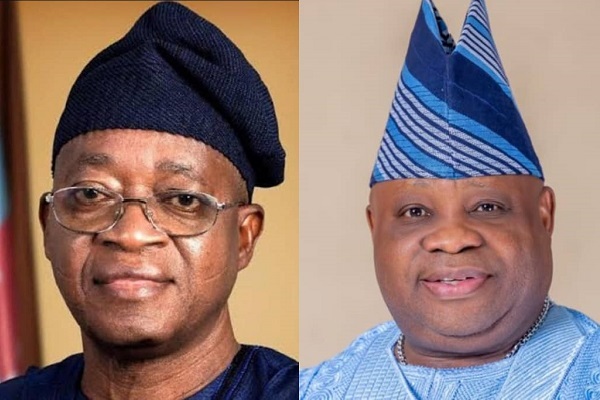The Supreme Court on Tuesday upheld the election victory of Ademola Adeleke as governor of Osun State, ending all disputes against him by Adegboyega Oyetola
The Osun State Election Petition Tribunal had on January 27, 2023, sacked Senator Ademola Adeleke as governor of the state on the grounds of over-voting in 744 polling units in the state.
The tribunal, in a majority decision, also declared Oyetola as the winner of the July 16, 2022 election.
But the tribunal verdict was overturned by the Court of Appeal following applications filed by Adeleke’s lawyer, Onyechi Ikpeazu SAN.
The Court of Appeal sitting in Abuja had on March 24, 2023, affirmed Ademola Adeleke as the actual winner of the Osun governorship election, citing evidence from the Bimodal Voter Accreditation System, BVAS, machine and voters register.
Ikpeazu had argued that Oyetola used incorrect polling unit results uploaded on the Independent National Electoral Commission’s back-end server at the Tribunal.
But Oyetola’s counsel, Lateef Fagbemi SAN, maintained that the Tribunal’s judgment followed scrutiny of evidence made available by INEC.
But a three-man panel of the Court of Appeal held that the tribunal was wrong to reach a conclusion on overvoting using oral witnesses without considering information on the BVAS machine and voters register which are central to the 2023 election.
In its judgment on Tuesday, a five-man panel of the apex court led by Justice John Okoro, whose lead verdict was prepared by Justice Emmanuel Agim, held that while Oyetola argued that the presiding officers who conducted the elections in 774 polling units did not use the BVAS machine, they could not substantiate it.
It said since the BVAS was the sole foundation and focal point of the appellant’s case, it was imperative that they produced the content of the BVAS in those affected polling units.
“It is glaring that the appellant did not produce any BVAS machine report as evidence to buttress his claim.
“It is not in dispute that the BVAS accredits voters, it is, therefore, the only direct and primary record of voters on election day, the apex court held.
He said that based on INEC regulations and guidelines, election results can only be collated if the results agree with the figures in the BVAS and the ones transmitted to the INEC Results Viewing Portal, IRev.
“Without the BVAS, it is impossible to rebuff this presumption,” the judge held.
He said it was important to note that the Electoral Act does not require presiding officers to transmit by BVAS the particulars of voters to the INEC backend server, “It only provides that the BVAS should scan results collated and transmits to the IREV.”
He said in light of the foregoing, it was the record on the BVAS for each polling unit that could prove the number of voters.
He added that voters register are to be used alongside the BVAS.
“INEC guidelines state that the accreditation process shall comprise of authentication of voters using the BVAS and identification of the electoral through the voter register,” he said.
The court held that the appellant, Oyetola did not produce the voters register as well.
He added the opinion of the INEC officials that testified at the Tribunal was made to serve a particular political interest.
“It is glaring that the appellants could not prove overvoting,” the court held.
The apex court further held that it was obvious that the appellant’s case collapsed at the point of evidence.
“The Court of Appeal correctly found that the appellant failed to prove their case, for this reason, I resolve the issues 3,5,9 in favor of the respondents.”
On the issue of certificate forgery, the apex court held it was settled by the Court of Appeal in two decisions, adding that the judgment settled the educational status of Adeleke.
“The entire proceedings at the Tribunal is a nullity.
“This appeal fails for lack of merit, it is accordingly dismissed. This judgment shall abide all sister appeals,” the court held in a unanimous decision.
Source: The Whistler


Comment here